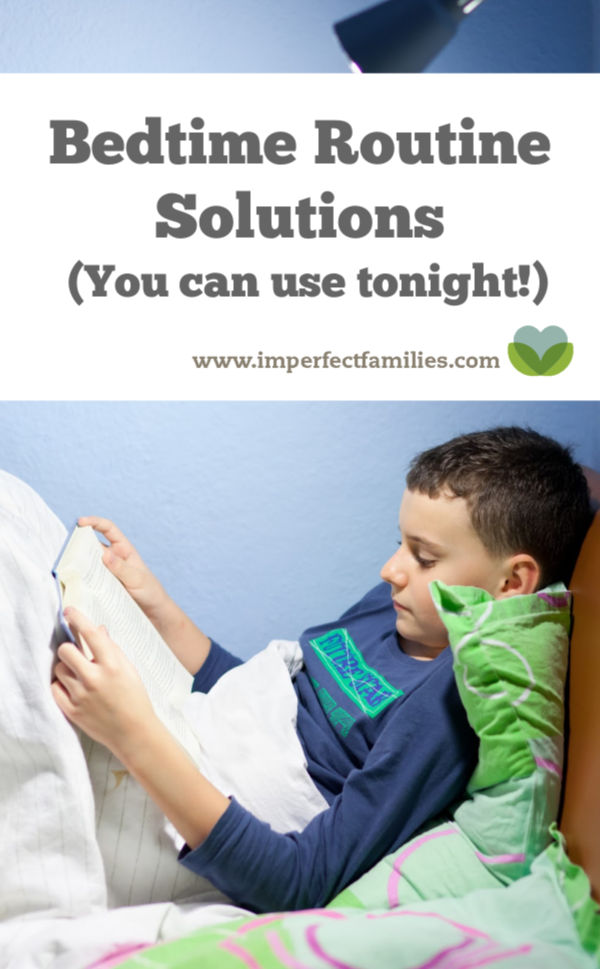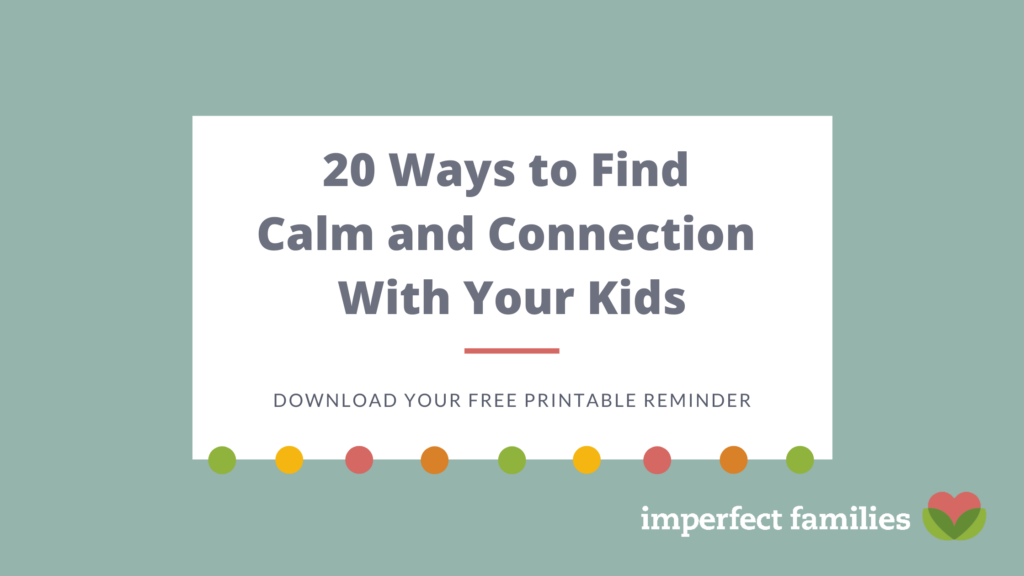You don’t have to dread bedtime! Use this list to create a bedtime routine solution that works for your unique child.

Bedtime.
That horrendous time of day when you are exhausted, and yet, your kids seem to have a never-ending supply of energy.
When all you want to do is sit down and veg out, and all your kids seem to care about is staying as close to you as physically possible.
Night after night.
You’re starting to dread the bedtime routine. And it’s only 2:00 pm.
Understanding the Bedtime Challenges
Before skipping ahead to the solutions, take a few minutes to explore the root of the bedtime challenges.
Click here to read a list of common reasons bedtime doesn’t go as planned.
After reading that list, you may have some work to do…and that’s OK. It’s better to address the underlying reasons something isn’t working than to focus on the “symptoms” of the problem (asking for 3 more books, 5 glasses of water, etc.)
Once you have a good understanding of what’s going on, you can look for bedtime routine solutions.
Bedtime Routine Solutions
I highly doubt that every single part of your bedtime routine needs to change. There are probably a lot of things you’re doing RIGHT! Keep what is working and then look for things to add or change if needed.
Mix and match these ideas to create a bedtime routine that works for your family:
- Address medical issues: Many things impact our ability to get a good night’s sleep. If you have concerns, talk to your child’s pediatrician, a sleep specialist, and/or a dentist to rule out any medical concerns before moving forward.
- Teach calming skills: The quiet of the dark can be prime time for anxieties. A child with a trauma history or previous difficulties sleeping can put their brain into a threat response rather than a calm state. Work on calming the brain before you require that they sleep independently.
- Be curious: Your child’s frequent requests and difficulty staying in bed may be a sign that he’s longing for connection. It might mean he’s feeling anxious. Rather than assuming the worst, look for the “why” behind the behavior.
- Start early: Create a calming routine before the bedtime routine officially begins – dim bright lights, read together, do yoga, play a board game, color or whatever else helps your child shift from an active brain to a calm brain.
- Limit screens: I know it’s easier to put on a TV show or reward them with a little screen time, but for most kids (and adults) screens tell the brain to “wake up and be alert” rather than to prepare for sleep.
- Do what works for your child: Every child is different, just because baths are calming for some kids, doesn’t mean they are for your child. Running around the yard or playing a game of chase may work better…and that’s OK!
- Slow down: Feeling pressured to move quickly to the next thing can cause some kids to panic, leading to aggression or resistance. Take a deep breath and be in the present moment. Let their brain calm before moving to the next task.
- Be organized: This might mean you need to set an alarm to start the bedtime routine, rather than losing track of time. It might mean you set out the pj’s and toothbrushes or pick out books earlier in the evening.
- Give a reminder: It’s not easy to move from playing to bedtime. Give your kids time to wrap up their activities. Join with them before moving them to the next thing, “Hey, show me what you’re building here…”
- Create a routine: Most kids feel secure when they know what’s coming next. Do what you can to stick with a similar routine each night. What you’re doing now might not be the best routine, it’s OK to mix it up and see what works best.
- Hand holding is OK: As your kids grow, they will be able to complete all of the bedtime tasks independently, but remember, their reserve is low at the end of the day. Sometimes, they may need help. It moves them along the routine and it’s connecting!
- Build anticipation: Rather than seeing bedtime as the ultimate disconnection or “end,” talk about the next day, about how you will greet your child in the morning, what you’ll eat, things you’ll do.
- Give them a special object. Bridge the disconnection of the bedtime routine by helping your child choose an object of yours to keep in bed with them – a shirt, a picture, a book, whatever reminds them of you.
- Empower choices: What would help your child feel calm and ready for sleep? A healthy snack? Light music or no music? Weighted blanket or no? Essential oils? Which scents? A nightlight or complete darkness?
- Focus on calm, not sleep: Rather than telling them “it’s time for sleep,” help them tune into how their body feels right before it falls asleep. Visualizations or mindfulness activities can help kids identify these sensations.
- Move out slowly: If you’re ready to limit your time in their room, make it a process. Talk about the changes in advance, “instead of sleeping in your bed, I’ll rub your back while I sit on the floor.” Build connection during the day, focus on calming the brain and body, express empathy and lead with confidence.
- Comfort, don’t ignore. Cries – especially hysterical cries – should not be ignored. Your child needs your calm presence to get their brain out of threat mode and back on track. With time, their brain will realize big feelings are manageable, even when you are not nearby.
Bedtime doesn’t have to be the most difficult part of your day, but it might take some time getting there.
Don’t give up! Continue to be curious about all the things that impact the bedtime routine. Then, do what you can to make changes.
Need more support?
If bedtime is still the time you dread more than any other time of day, let’s talk. An Online Parent Coaching session can help you see the situation differently, learn new strategies, and find solutions that work for your unique child. Learn more and schedule your first session today!



Comments have been turned off to retain the privacy of all families. If you have a question or comment on the topic, you're always welcome to contact me.